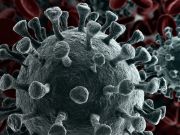- Are You Making This Expensive Thermostat Error This Winter?
- Recognizing the Signs of Hypothyroidism
- 10 Strategies to Overcome Insomnia
- Could Artificial Sweeteners Be Aging the Brain Faster?
- Techniques for Soothing Your Nervous System
- Does the Water in Your House Smell Funny? Here’s Why
- Can a Daily Dose of Apple Cider Vinegar Actually Aid Weight Loss?
- 6 Health Beverages That Can Actually Spike Your Blood Sugar
- Treatment Options for Social Anxiety Disorder
- Understanding the Connection Between Anxiety and Depression
Curbing COVID Brought Unexpected Benefit for Asthma Patients

Measures enacted to slow the spread of the new coronavirus also appeared to reduce hospitalizations for asthma, a new study finds.
Researchers compared weekly data on hospitalizations at 272 hospitals in Japan in the first five months of 2020 to the same period in 2017, 2018 and 2019.
Asthma hospitalizations in 2017-19 and 2020 showed similar trends until week eight, but in 2020 hospitalizations began to decline in week nine, the study found.
Hospitalizations for COVID-19 were first recorded during week seven of 2020. Further analysis found a significant decrease in the average number of asthma hospitalizations during weeks nine to 22 of this year compared to 2017-19.
The findings were published Oct. 13 in The Journal of Allergy and Clinical Immunology: In Practice.
“Asthma hospitalizations usually indicate that an individual’s asthma is not currently under control,” corresponding author Dr. Atsushi Miyawaki, of the University of Tokyo, said in a journal news release. “This would suggest that asthma control improved during the pandemic. It illustrates the importance of environmental factors when it comes to treating and managing patients with asthma.”
One possible explanation is that increased hygiene to prevent COVID-19 would also reduce exposure to asthma triggers, according to the researchers. Enhanced precautions — such as frequent cleaning and reduced smoking — by people concerned that COVID-19 may trigger asthma may also have helped reduce triggers.
Other possible explanations include people being more likely to use preventative asthma medications, and community COVID-19 prevention measures helping reduce other respiratory infections, which can cause worsen asthma.
More information
The U.S. National Heart, Lung, and Blood Institute has more on asthma.
Source: HealthDay
Copyright © 2026 HealthDay. All rights reserved.










